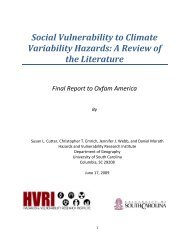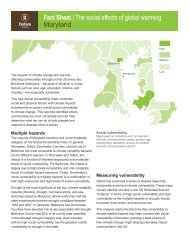Poverty Footprint Study on how the Coca Cola - Oxfam America
Poverty Footprint Study on how the Coca Cola - Oxfam America
Poverty Footprint Study on how the Coca Cola - Oxfam America
You also want an ePaper? Increase the reach of your titles
YUMPU automatically turns print PDFs into web optimized ePapers that Google loves.
Mill work is also physically strenuous and demands<br />
l<strong>on</strong>g hours, and is <strong>the</strong>refore traditi<strong>on</strong>ally c<strong>on</strong>sidered<br />
more appropriate for men. Despite <strong>the</strong> low rates<br />
of female employment, no overtly discriminatory<br />
practices were identified during routine audits.<br />
The <strong>Coca</strong>-<strong>Cola</strong> Company’s supplier standards<br />
require that <strong>the</strong> mills uphold internati<strong>on</strong>ally<br />
recognized n<strong>on</strong>discriminati<strong>on</strong> standards.<br />
Women in SABMiller’s bottlers<br />
Women are underrepresented in formal jobs at<br />
bottling plants in both countries. Despite str<strong>on</strong>g<br />
policies requiring n<strong>on</strong>discriminati<strong>on</strong>, most bottling<br />
plant jobs are perceived as more appropriate for<br />
men given that <strong>the</strong>y require physical strength.<br />
O<strong>the</strong>r factors c<strong>on</strong>tributing to <strong>the</strong> low rates of female<br />
employment may include security challenges.<br />
The research revealed that formal jobs in <strong>the</strong> value<br />
chain are male dominated and that <strong>the</strong>re is gendersegmentati<strong>on</strong><br />
by occupati<strong>on</strong>, type of activity and level<br />
of seniority in <strong>the</strong> value chain. Despite formal policies<br />
to prevent discriminati<strong>on</strong> against women in <strong>the</strong><br />
workplace, women remain underrepresented.<br />
Several factors have led to this imbalance, <strong>on</strong>e of<br />
which is <strong>the</strong> lack of security for workers who travel<br />
l<strong>on</strong>g distances to work.<br />
Recommendati<strong>on</strong>s for follow-up acti<strong>on</strong><br />
Women in distributi<strong>on</strong> and retail<br />
Women most often work in distributi<strong>on</strong> as employees<br />
or al<strong>on</strong>gside <strong>the</strong>ir husbands, and are less frequently<br />
<strong>the</strong> owners of <strong>the</strong> businesses. In Zambia, for<br />
example, husband-and-wife teams own and<br />
operate two of <strong>the</strong> country’s largest independent<br />
distributorships. Women in <strong>the</strong> distributi<strong>on</strong> business<br />
interviewed for this study indicated <strong>the</strong>y were<br />
c<strong>on</strong>cerned that <strong>the</strong>y had fewer opportunities for<br />
advancement and business growth than men. They<br />
noted that <strong>the</strong> distributi<strong>on</strong> business was particularly<br />
susceptible to crime and requires physical strength,<br />
presenting challenges for women.<br />
By c<strong>on</strong>trast, women play a very significant role as<br />
owners and operators of small-scale retail outlets.<br />
In <strong>the</strong> cases where <strong>the</strong>se outlets are attached to<br />
<strong>the</strong>ir homes, women are able to work while at <strong>the</strong><br />
same time being in c<strong>on</strong>tact with <strong>the</strong>ir families. Of <strong>the</strong><br />
approximately 64,000 retail outlets in El Salvador,<br />
an estimated 76 percent62 are owned or managed by<br />
women, and in Zambia, a third of <strong>the</strong> approximately<br />
25,000 outlets are estimated to be women-owned.<br />
Both bottling plants offer training workshops for<br />
small retailers. Women retailers interviewed for this<br />
study reported that lack of access to credit limited<br />
<strong>the</strong>ir ability to grow <strong>the</strong>ir businesses. However, in El<br />
Salvador, women retailers reported having <strong>the</strong> same<br />
access to credit as <strong>the</strong>ir male counterparts.<br />
Establish focused business training and support for women in <strong>the</strong> <strong>Coca</strong>-<strong>Cola</strong>/SABMiller value<br />
chain to work toward more equal employment opportunities.<br />
Make fur<strong>the</strong>r efforts to recruit women for n<strong>on</strong>traditi<strong>on</strong>al and senior management jobs.<br />
C<strong>on</strong>sider ways to increase women business partners’ access to credit, taking into account <strong>the</strong><br />
unique circumstances women face when running businesses in <strong>the</strong>se communities.<br />
Research <strong>how</strong> operati<strong>on</strong>s and practices in <strong>the</strong> value chain empower or undermine small women<br />
farmers.<br />
Exploring <strong>the</strong> links between internati<strong>on</strong>al business and poverty reducti<strong>on</strong> 63




